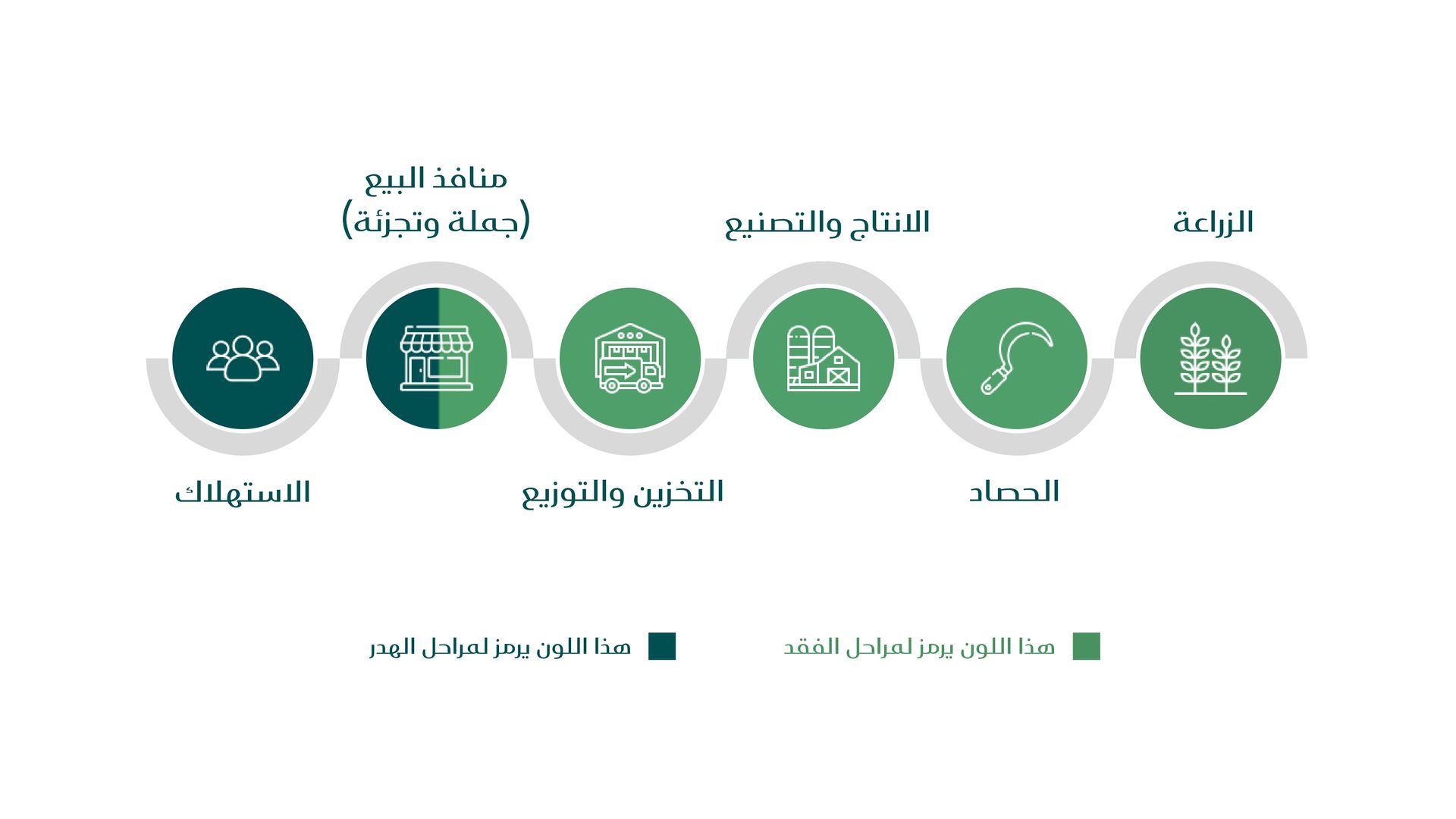
In line with the directions of Saudi Vision 2030 and the National Transformation Programs, which aim to effectively invest natural resources and enhance operational efficiency, and in achieving one of its goals which states that "we will work with consumers, food manufacturers, and traders to reduce waste," the Ministry of Environment, Water, and Agriculture has adopted the initiative "National Program for Reducing Food Loss and Waste" based on global standards, experiences, and best practices. The ministry has entrusted its implementation to the Public Authority for Food Security.
The national program is based on two main pillars: reducing loss and reducing waste. The program also aims to prepare a legislative framework to reduce food loss and waste in the Kingdom of Saudi Arabia. And providing training for stakeholders in the private sector on best practices to reduce food loss and waste, thereby enhancing cooperation among stakeholders in the supply chain to improve product reuse. Finally, enhancing the recycling capabilities of food waste unfit for human consumption.
The program consists of four phases: the first phase is a study on food loss and waste and how to reduce them in the Kingdom of Saudi Arabia (field survey), followed by a national awareness and training program to reduce food loss and waste (where media awareness is considered the fastest way to reach the largest number of the target audience, which is the goal of the Food Security Authority), and then the National Observatory for Food Loss and Waste in the Kingdom of Saudi Arabia. And concludes with a study on the capabilities of recycling waste and benefiting from food loss and waste.
The authority has signed a contract with Imam Muhammad bin Saud Islamic University to implement the first phase of the program through a field study (field survey) using scientific methods according to international standards, comparing the extent of food loss and waste in the Kingdom of Saudi Arabia with some other countries, measuring the economic losses resulting from food loss and waste, analyzing the economic, social, and cultural causes of food loss and waste, and then proposing appropriate initiatives, policies, and plans to reduce food loss and waste.
By the grace of God, the awareness campaign to reduce food loss and waste has been awarded to a national company, which will launch "Allah willing" in the coming period and continue for twenty-four months. This campaign aims to produce high-quality media outputs that contribute to encouraging community members to adopt effective behaviors to reduce food loss and waste in the Kingdom, in accordance with the campaign's objectives, which focus on this project as one of the most prominent directions to relieve pressure on the national economy. Food loss and waste are contrary to the teachings of Islam and indeed undermine the economy. It is also important to raise awareness about reshaping the local community's consumption patterns and limiting the spread of extravagance that has greatly harmed the components of the national economy, particularly in relation to food security. The campaign will be conducted in three phases, each consisting of two campaigns.
Loss
It is the quantities of food that are lost (wasted) along the food supply chain (in farms, factories, transportation, etc.) and do not reach the final consumer.

Waste
It is the food designated for consumption that is wasted after the stages of production and distribution at the final consumer level in restaurants, hotels, homes, and elsewhere.

- Study of Loss and Waste (Field Survey)
- National awareness and training program
- Study on the recycling capabilities of food waste
- National Observatory for Food Loss and Waste
Study of Loss and Waste (Field Survey)
The first phase
Study of Food Loss and Waste (Field Survey) and Reducing Them in the Kingdom of Saudi Arabia - Main Objectives for Conducting a Field Survey on Food Loss and Waste
-
Estimating the volume and percentage of both food loss and waste using scientific methods according to international standards (baseline).
-
Measuring the economic losses caused by food waste and loss, and proposing systems and laws to reduce these phenomena.
-
Analysis of the economic, social, and cultural causes of food loss and waste in the Kingdom of Saudi Arabia
-
The relationship between behavioral economics and loss and waste, and how to use its applications to instill it in society.
-
Comparison of the volume and percentage of food loss and waste in Saudi Arabia with some other countries (Arab and foreign)
-
Providing the authority with the performance indicator for loss and waste up to 2020 in the National Transformation Program.
National awareness and training program
The introduction and the content
Media awareness is considered the fastest way to reach the largest number of the target audience. Therefore, the Public Authority for Food Security is keen on producing high-quality media outputs that contribute to encouraging community members to adopt effective behaviors to reduce food loss and waste in the Kingdom, in accordance with the campaign's objectives, which are concerned with this project that represents one of the most prominent directions to alleviate pressure on the national economy. Food loss and waste are contrary to the teachings of Islam and indeed undermine the economy. It is also important to raise awareness about reshaping the local community's consumption patterns and limiting the spread of extravagance that has greatly harmed the components of the national economy, particularly in relation to food security. The campaign will be carried out in three phases, each consisting of two campaigns.
The goals
-
Reminding of the guidance of Islam in the etiquette and manners of dealing with food
-
Clarifying and establishing the difference between the goal of the National Program to Reduce Food Loss and Waste (Awareness, Education, and Engagement) in purchasing and consumption.
-
The goal of the Blessing Preservation Associations, which is to address extravagance (so that it is not disrespected).
-
Rationalizing food consumption and promoting the culture of behavioral economics in consumption among various segments of the local community.
-
Raising awareness among individuals, families, and large consumer groups, such as restaurants, hotels, public and private schools, and universities for both genders.
-
Raising awareness of good practices in supply chains such as production, transportation, manufacturing, marketing (loss), and consumption (waste) to reduce food surplus.
-
Intensifying the role of qualitative media in spreading awareness about the danger of food loss and waste
-
Promoting a culture of balanced eating to avoid weight gain and excessive food consumption, and raising community awareness about health impacts.
-
Raising awareness about food shopping and purchasing rules and suggesting ideal supporting methods for that.
-
Instilling behavioral economics among community members and explaining the importance of using its applications.
Study on the recycling capabilities of food waste
Partnership with the private sector to establish specialized facilities for recycling food waste, converting it into animal feed, and selling it to livestock farmers (targeting: producers, food traders, distributors, and wholesalers...). Etc.)
National Observatory for Food Loss and Waste
Creating an online electronic platform and a smartphone application that connect the stakeholders in the supply chain to combine efforts and align supply with expected demand (targeting: producers, food traders, distributors, wholesalers, the food preservation sector, and ultimately the beneficiaries).

HAWAZ

DIGITAL RESEARCH COMPANY

المجلس الفرعى التخصصى لجمعيات حفظ النعمة

Imam Mohammad Ibn Saud Islamic University

Food and Agriculture Organization

شركة دار العرب

 Voice Commands
Voice Commands





